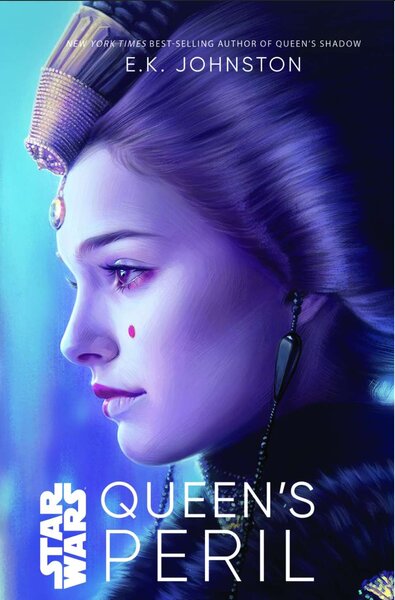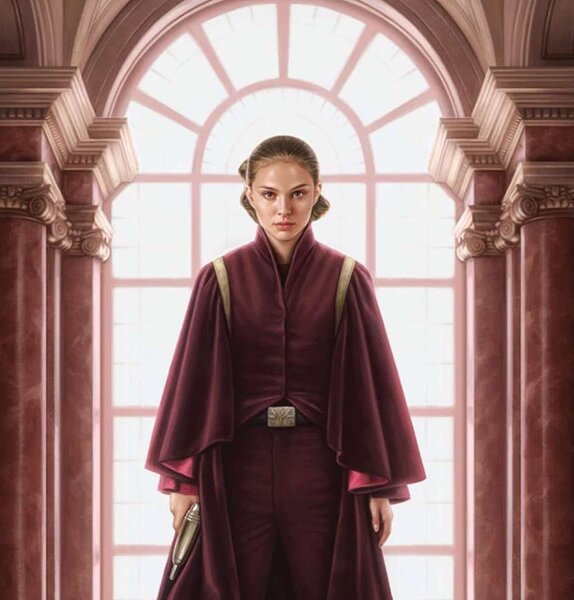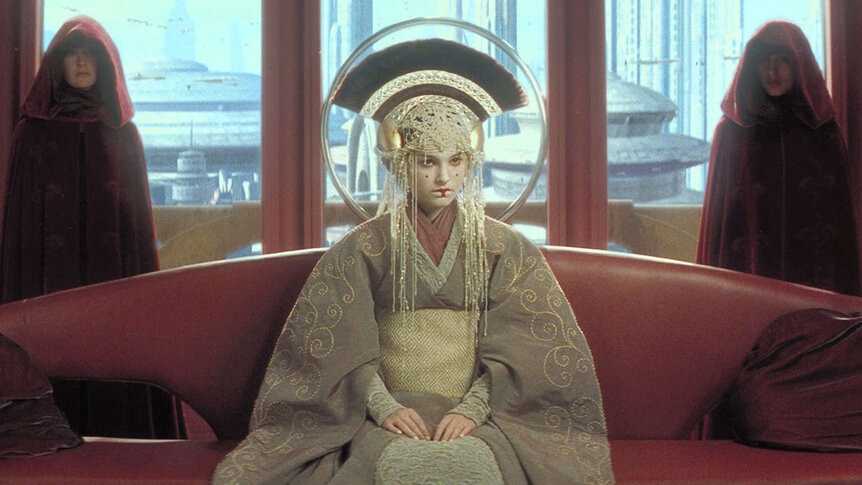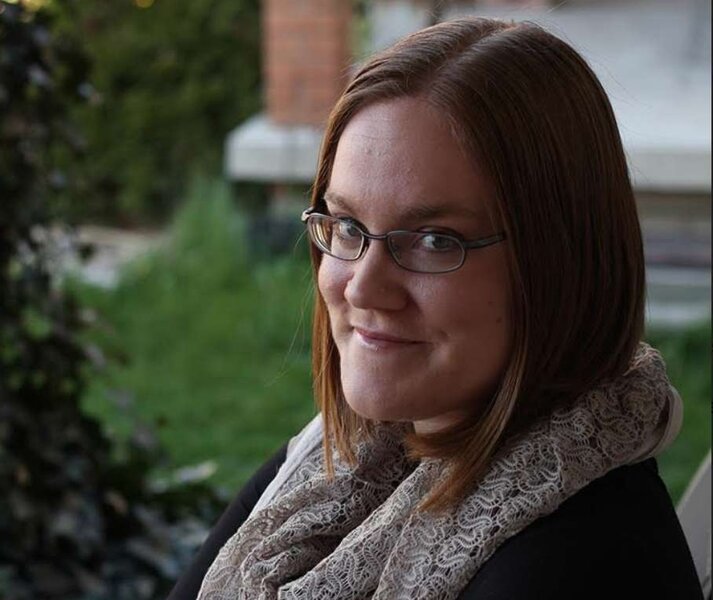Create a free profile to get unlimited access to exclusive videos, sweepstakes, and more!
Teen Padmé transforms into the Monarch of Naboo in E.K. Johnston's new Star Wars novel, Queen's Peril
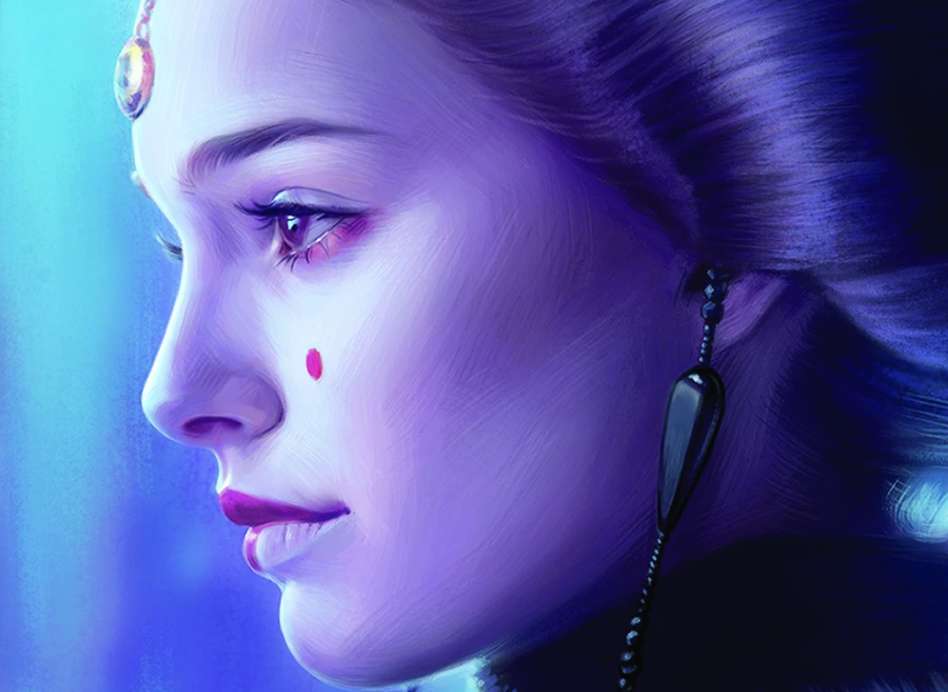
Whichever side of the fence you're on about the first Star Wars prequel, Star Wars: The Phantom Menace, there's no denying the deep affection fans have for Padmé Naberrie and the engrossing story of how she became the Queen of Naboo.
Last year's YA Star Wars novel from New York Times bestselling author E.K. Johnston, Queen's Shadow, educated and entertained readers with tales of the young noble's transition from Queen Amidala to Senator of Naboo in the aftermath of the climactic events depicted in the Lucas-directed 1999 film.
Now Johnston's new YA novel, Star Wars: Queen's Peril, set just before and alongside The Phantom Menace, expands the relationship between Amidala and her handmaidens as a battle with the Trade Federation weighs heavily on her heart.
The 288-page canonical prequel book, published by Disney-Lucasfilm Press, is available on June 2, 2020 — and SYFY WIRE has an exclusive excerpt to share, accompanied by a chat with its award-winning writer. Might there be a Jar Jar Binks cameo? Meesa thinks maybe so!
Can you take us on a quick plot tour of Queen's Peril and tease what readers can anticipate as the story unfolds?
Queen's Peril begins the day of Queen Amidala's election and ends shortly after the Battle of Naboo. This means I got to write my favorite trope — "Putting the Team Together" — as all the handmaidens are just starting to feel comfortable in their jobs and uncomfortable in their personal relationships, right when the Trade Federation shows up.
It seems there's a true craving for more Padmé tales. What is it about Queen Amidala's popularity that warrants a prequel examination of her teen life?
Since 1999, we've heard the refrain "Why would a planet elect a 14-year-old queen? She must be a puppet," and I wanted to knock that right back on its heels. Of course, it takes a very particular kind of 14-year-old (and some friends!) to do the job, but I wanted to answer that question anyway because it's definitely something that the audience wondered about.
Who is this girl? What makes her so special? How did she do it? Where did she get those amazing dresses?
What new canonical elements you were able to add to Star Wars through this novel?
I added girls actually having their periods to Star Wars (it's mentioned briefly in Beth Revis' Rebel Rising as Jyn grows up, but this is, as far as I know, the first time a character has to deal with it on-screen).
Oh, and I guess the sector-wide summit that Padmé organizes to deal with the impending food situation on Naboo is also kind of important. I had always wondered how a planet like Naboo could go from OK to "the people are starving" in a week.
Which aspects and themes of Padmé and her handmaidens, court confidants, and decoys were most important to present?
Friendship, I think, followed very closely by a strong sense of duty. At the beginning, all of the girls are separate entities, and the things they have in common is that they're all very smart and they're all very service-minded. As they come together, they hit all sorts of complications and have to make complicated choices, but at the end of everything, they are there for Padmé, no matter what.
Taking place just prior to and dovetailing into the events in The Phantom Menace, where did you turn to for research and worldbuilding?
Well, if by research you mean "has been a massive fan of Padmé, Naboo, and all associated ephemera since 1999," then I guess you could say I've been training for this job my whole life. A lot of the work is there, in bits and pieces, and getting to make it cohesive was a lot of fun.
How was writing this teenage Padmé book different from Queen's Shadow and Ahsoka?
Queen's Peril has the most characters of any Star Wars book I've written so far, and it was definitely a challenge to get into so many voices (especially since six of them have to sound very similar, but still be different!).
It also had no firm "start date." Ahsoka and Shadow both have on-screen anchors on both ends of the story, whereas Peril only has the ending. That gave me some freedom to really get into what makes Naboo tick.
With Star Wars feature films on hiatus for two years, how do these in-universe novels help satisfy the fandom's desire for more Star Wars content?
I mean, quite honestly, two years feels like nothing. Star Wars fans have waited for way longer before (and with less of an idea that we were ever going to get the films back), and with the TV shows, there's still really good content on-screen.
That said, the books will always have a key part in Star Wars storytelling because they let us get into the heads of the characters we know and love so much. Those up close and personal portrayals complement the visuals, and I love getting to be part of a multimedia storytelling galaxy.
Which of Queen Amidala's outlandish gowns or elaborate costumes would you most want to parade around in?
The travel gown from Attack of the Clones, no contest. Maybe not the hat.
What's the best part about playing in the vast Star Wars sandbox?
For me, the best part is the collaboration. Even if you don't know the exact details, you're working with all these other writers on a story that keeps getting bigger and bigger, and trading pieces of that back and forth is so much fun.
Now enjoy an exclusive preview of the preface to Star Wars: Queen's Peril by E. K. Johnston and released June 2 from Disney–Lucasfilm Press.
This was not the customary way to receive exam results. The Theed Conservatory attracted students from all over the planet, even though it was hardly the only music school on Naboo. It wasn’t even, in public opinion, the best one. Set in an old building, far from any of the main hubs of the city’s entertainment, the conservatory was known for its traditions. That was why families sent their children there. A musician trained there was consistent. Steady. Reliable. Ready to pass traditions on to a new generation of listeners and students alike, whether anyone wanted it or not.
Tsabin had hated almost every moment of it.
There had never been any question about where she would be sent. There hadn’t even been any question about what instrument she’d play. Her brothers had forged the path ahead of her, and all she had to do was follow along. There was never any question of her doing something so bold as leading. She simply didn’t have the talent for it. She was good enough, and offworld she might even make a living as a soloist somewhere that didn’t know any better, but Tsabin had known for her entire life that she was never going to be in the front row of any orchestra.
And now she waited in a small room, staring down an empty chair across an unremarkable table. She had been sent there by the proctor droid, barely thinking about the unfamiliar room number, expecting to find out how she’d done on her finals. Instead: a dark room and an endless-seeming wait.
Tsabin had made it as far as she had by hiding her true feelings from everyone, and she wasn’t about to crack now, not even for outdated bureaucracy.
The door finally opened—really swinging on real hinges, because that was the sort of place the Theed Conservatory was—and Tsabin straightened in the chair. Even if it was only the droid, it was important to be ready. Conservatory droids were known to monitor students’ posture and bearing, keeping track of who was the best at looking like a musician, as well as performing mundane tasks. But the person in the doorway was not a droid. Tsabin took a deep breath without giving any appearance of doing so, another benefit of a conservatory education.
He was taller than she was, which wasn’t saying a lot. It was a place to start, though. He wore the blue and maroon of the Naboo Royal Security Forces, his hat tucked under his arm since he was inside. He had short-cropped hair and dark brown skin, and his eyes were almost warm, except that something around the edge of him prevented that measure of relaxation. He took the other seat without introducing himself, and placed the hat on the table between them.
If the security officer were hoping to rattle her, he’d picked the wrong day for it. Exams were over, and Tsabin had gotten a full night’s sleep for the first time in weeks. Her family had all been in touch with her that morning. Her brothers had reassured her that everything would be fine, and her parents had let her know where they could be reached when her results were in. She knew she hadn’t done anything to merit this visit, so it must be a curiosity. It must be something he wanted from her. So Tsabin looked at him calmly, every wall she’d ever built shielding her from him.
After several long minutes, the ghost of a smile appeared on his lips, and he stretched a hand across the table toward her, palm up.
“Quarsh Panaka,” he said. “Royal Security Forces. But I assume you could tell that for yourself.”
“Tsabin,” she replied, politely shaking his hand. “Yes.”
He let her go, and she returned her hands to her lap. He folded his on the table and looked at her.
“How do you feel about the election?” he asked.
Tsabin raised an eyebrow in spite of herself. She had not expected that question.
“I am not required to tell you,” she replied.
“That’s true,” he said, and almost laughed. “You will at least confirm that you are aware of the candidates?”
“Of course,” she said. “This is the first year I get to vote.”
“You’re thirteen,” he said. He leaned back in his chair without losing any sense of being on guard.
“I’ll be fourteen by then,” she told him. “You must have at least discovered my birthday before you came in here.”
“I did,” he said. He tapped his fingers on the tabletop.
Tsabin was starting to get annoyed. Yes, it was the first day of the rest of her life—at least in theory, given that her formal education was all but finished—and she didn’t exactly have plans, but she also didn’t want to waste the day in this room with this man.
“Your teachers say you are diligent,” Panaka said. “You are never late. You are scrupulous when it comes to performing your part, and your conduct is near perfect at all times.”
Tsabin waited for the other shoe to drop, as it always did.
“And yet you are always second best,” Panaka continued. “At everything you have ever tried.”
Almost fourteen years of hard-fought control snapped through Tsabin’s entire body. She would not give him the satisfaction of seeing how much it hurt. She would never, ever give that to anyone. Her stomach clenched, but she didn’t blink or even tighten her jaw at his words. They were, after all, only the truth: her brothers were better musicians than she was, and no matter what she did at the conservatory, there was always someone else who did it better than she.
Panaka stood and picked his hat up off the table.
“I can’t say anything officially, of course,” he said. “But I would request that you not accept any apprenticeship offers until after the election. I will be in touch.”
With those words, he left. Tsabin was free to go. But she reached into her pocket for her screen and pulled up the list of candidates running for Queen of Naboo. She had read their names and their platforms before, but this time, she made herself really look at them. At her.
Amidala, she called herself. They could be twins, almost. Two girls with the same face. And a security officer had come all the way here to talk to a girl who was always second.
Tsabin stayed in the room until the droid came looking for her, her mind awake to the possibilities.
